Let's talk Bichon Frisés
It’s hard to describe the Bichon Frisé without using the word ‘fluffy’. Their hair is practically cloud-like in its softness although the bouffant look is optional (they aren’t born symmetrically groomed). And while they don’t shed, Bichon Frisés definitely need daily attention paid to grooming to keep that beautiful coat from matting. Naturally affectionate and ultra-friendly, Bichon Frisés don’t always discern between people they know and people they don’t, greeting both with tail-wagging enthusiasm. Even so, the Bichon Frisé’s temperament is one of the pleasures of this playful breed.
Official name: Bichon Frisé
Other names: Bichon Frise
Origins: France
Drooling tendencies
1 out of 5Shedding Level
1 out of 5Energy level*
3 out of 5Compatibility with other pets
5 out of 5Warm weather?
3 out of 5Suited to apartment living
4 out of 5Family pet?*
5 out of 5
| Male | Female |
|---|---|
| Height | Height |
| 25 - 30 cm | 23 - 28 cm |
| Weight | Weight |
| 5 - 8 kg | 5 - 8 kg |
| Life stages | |
|---|---|
| Adult | |
| 10 months to 8 years | |
| Mature | Senior |
| 8 to 12 years | From 12 years |
| Baby | |
| Birth to 2 months | |
Drooling tendencies
1 out of 5Shedding Level
1 out of 5Energy level*
3 out of 5Compatibility with other pets
5 out of 5Warm weather?
3 out of 5Suited to apartment living
4 out of 5Family pet?*
5 out of 5
| Male | Female |
|---|---|
| Height | Height |
| 25 - 30 cm | 23 - 28 cm |
| Weight | Weight |
| 5 - 8 kg | 5 - 8 kg |
| Life stages | |
|---|---|
| Adult | |
| 10 months to 8 years | |
| Mature | Senior |
| 8 to 12 years | From 12 years |
| Baby | |
| Birth to 2 months | |
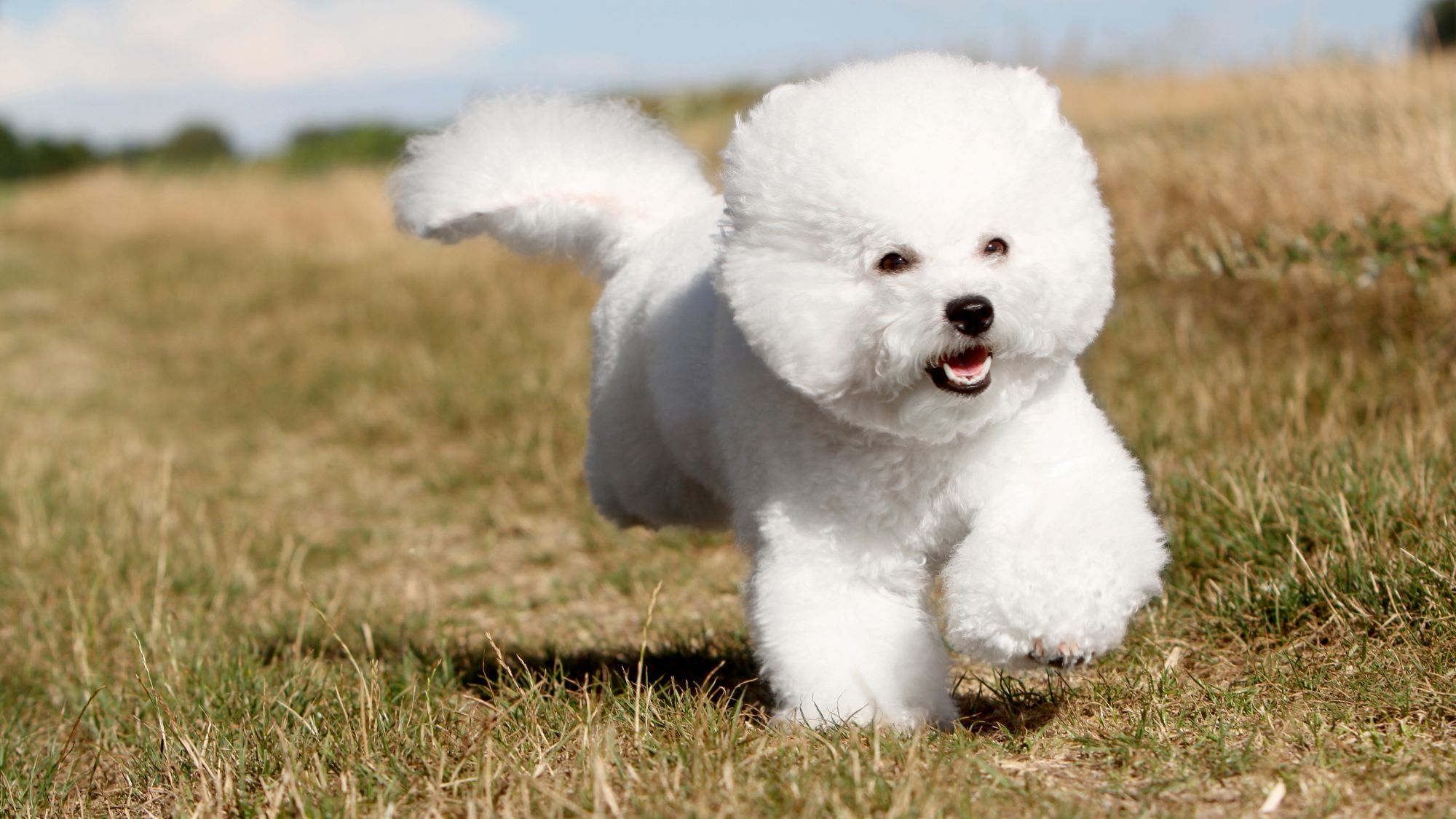
Get to know the Bichon Frisé
All you need to know about the breed
Bichon Frisé or Bichon Frise? While the world can agree that this is one playful, open and affable breed, it can’t always agree on the breed’s name, spelling or pronunciation. Their French name, Bichon à poil frisé, or curly-haired little dog, has the accent on the last letter; but in English-speaking countries, the breed is known as the Bichon Frise, accent-free in both writing and pronunciation. That’s okay, these confident dogs know who they are.
Adaptable and full of energy, the breed is well-suited to city life due to their compact size and easy-going nature. As has been said, there are no strangers to the Bichon Frisé, just humans they haven’t met yet. As such, they are known to form incredibly strong bonds with their human families. Have owner, will follow.
Equally known for their silky, powder puff coat, the Bichon Frisé does require near daily brushing to keep them looking their best. They will most likely be sitting in your lap much of the time anyway so just keep the brush nearby.
The Bichon Frisé breed comes in varying shades of white, extra-white, and even a slightly apricot-tinged white. If you were thinking that the Bichon looks a lot like the Maltese, Havanese or Bolognese, you have a good eye, they are not so distantly related.
While the Bichon Frisé can take a little longer to housetrain, their intelligence means they respond well to positive reward-based training overall. They just want to please you, basically.
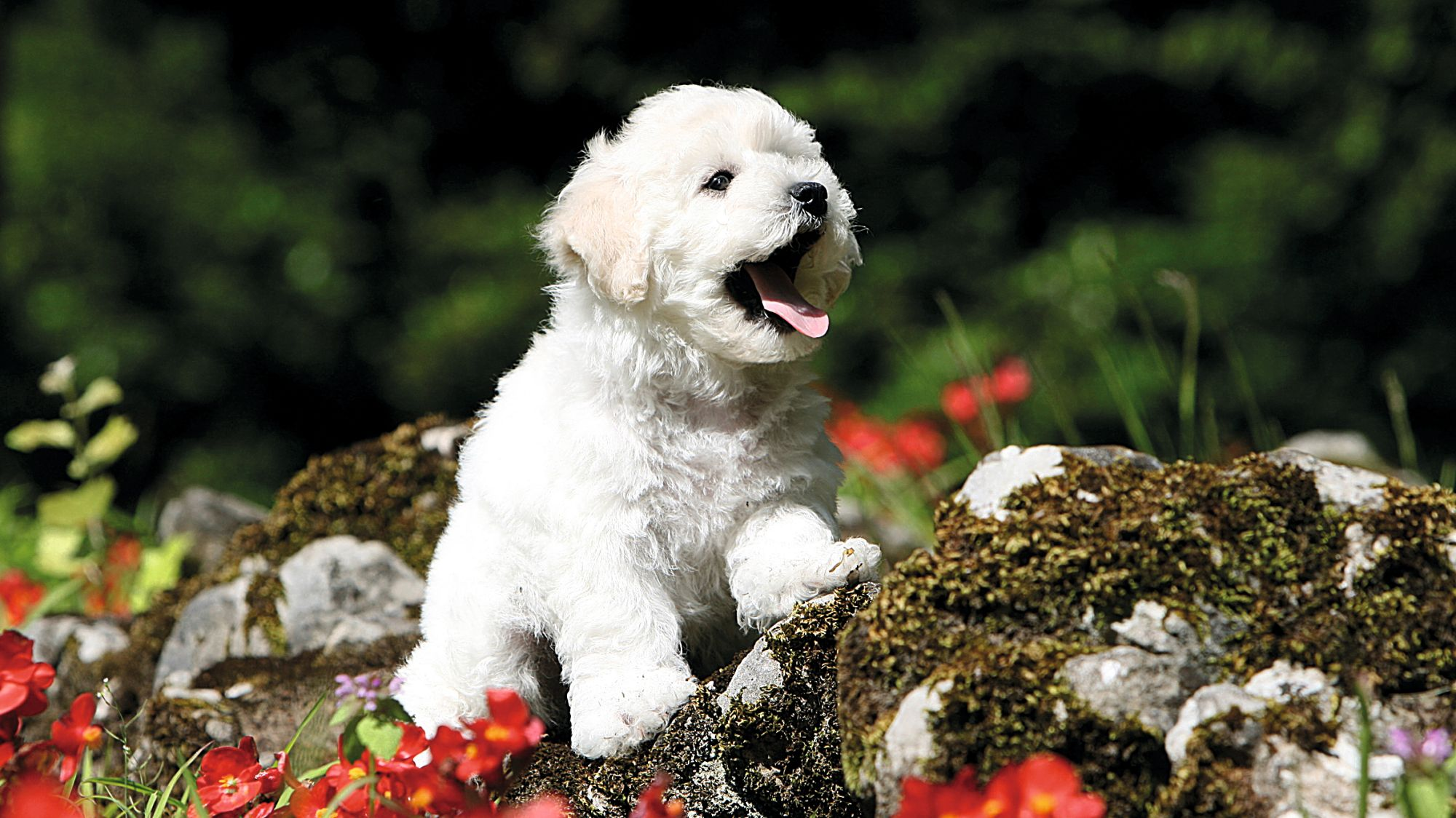
2 facts about Bichon Frisés
1. Parlez-vous Français?
While the Bichon Frisé as we know it today has French roots, the breed’s earliest ancestors were actually Spanish and Italian, sailors and noblemen equally. That’s why some refer to the Bichon Frisé as having Mediterranean origins, thereby covering all bases.
2. Brush up on your grooming
Supremely easy-going as a breed, the same cannot be said for the Bichon Frisé’s grooming needs. That soft, fluffy coat must be brushed daily where possible to prevent matting. And, as with many small breeds, they can be prone to teeth and gum issues, so grab a toothbrush while you are at it! The good news: Neither brushing routine takes long.

History of the breed
The Bichon Frisé’s history is long and as interesting as the breed itself. Typically and rightfully associated with France, the breed is believed to have originally descended from Spanish sailing dogs in the Canary Islands, keeping sailors company during long voyages. The Tenerife Bichon, as they were known, is thought to be one of the Bichon Frisé’s forebears.
By the 13th century, they were housed in royal courts all over Spain, Italy and France. It was the latter who bred the lapdog we know and love today, probably around the time of the French Renaissance in the 16th century. Beloved by nobility, the Bichon Frisé had a grand old time of it. However, when the French Revolution began, their royal owners were sent to the guillotines, leaving Bichon Frisés to fend for themselves. Saved by the reign of Napoleon III, the breed was in the royal court once again, adored, pampered and dressed to the nines, the inspiration behind a new French verb: bichonner, meaning “to pamper.”
Throughout their history, fanciers would swoop in and keep the Bichon Frisé going as their fame ebbed and flowed and ebbed again. They didn’t appear in America until 1955. The Bichon Frise Club of America was formed in 1964 – note the Americanisation of the name – with the breed finally recognised by the American Kennel Club in 1971.
From head to tail
Physical characteristics of Bichon Frisés
1.Neck
2.Eyes
3.Ears
4.Head
5.Coat
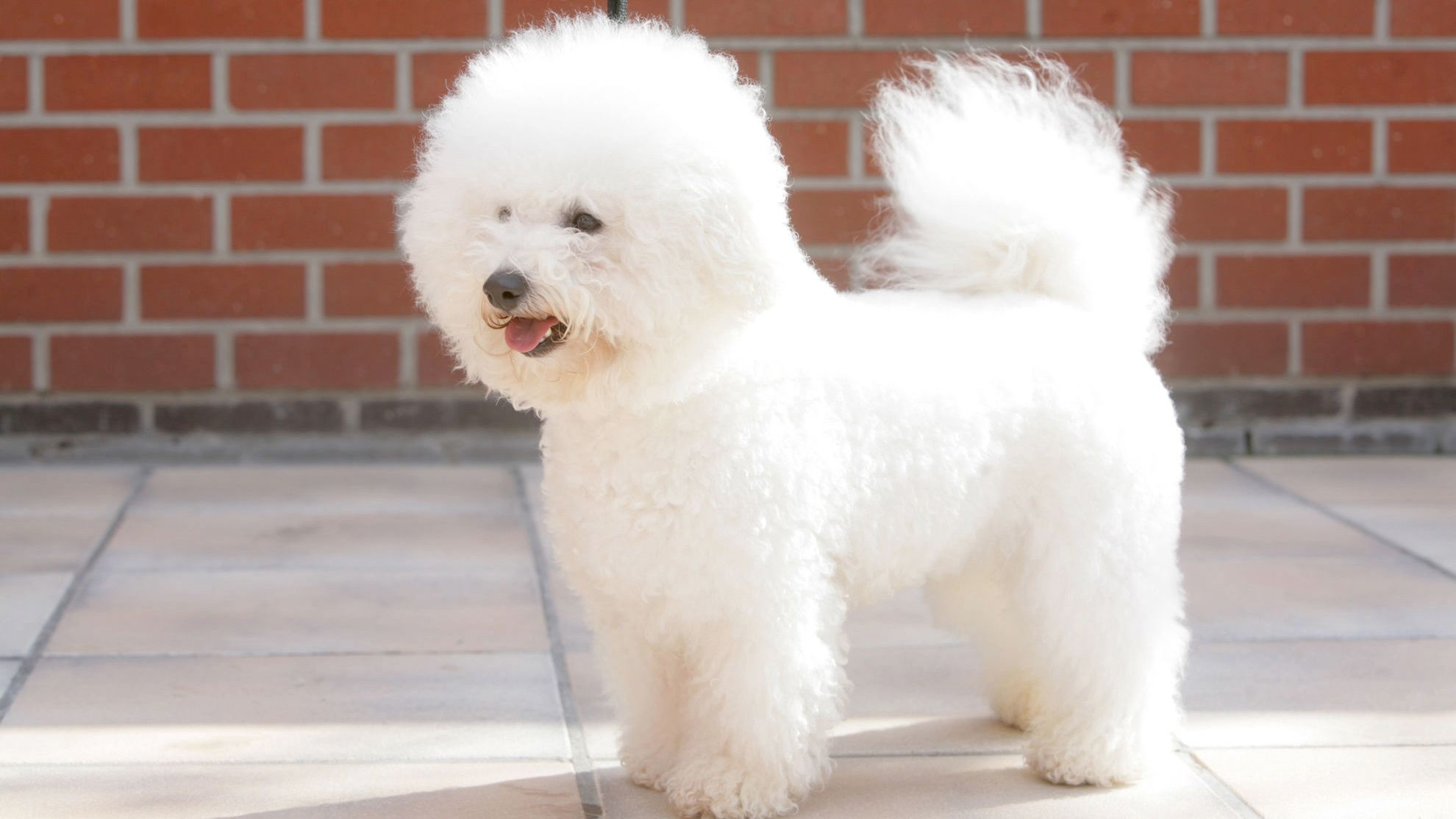
Things to look out for
From specific breed traits to a general health overview, here are some interesting facts about your Bichon Frisé
A pretty healthy breed overall
While the Bichon Frisé is quite a healthy breed of dog overall, and a reputable breeder will have screened the parents for certain health conditions, you will need to test yearly for hip and patella issues. The breed can also be prone to bladder infections as well as an eye condition called ‘glaucoma’. It’s always a good idea to check your dog’s eyes regularly, looking out for symptoms such as squinting, watery irritation or any kind of swelling or bulging. If you spot anything unusual, it’s best to consult your vet at the first available opportunity. They will help you stay on top of your dog’s good health.
Don’t forget your toothbrush.
Like many Toy breeds of dogs, the Bichon Frisé can be prone to problems with their teeth and gums. If left untreated, this can develop into ‘periodontal disease’ – inflammation and infection of the gum tissue. As well as being painful for your Bichon Frisé, it can also result in them having difficulty eating and tooth loss, and potentially more serious complications. It is best prevented with daily brushing. Routine cleanings and exams with your vet are also recommended.
Healthy diet, healthier dog
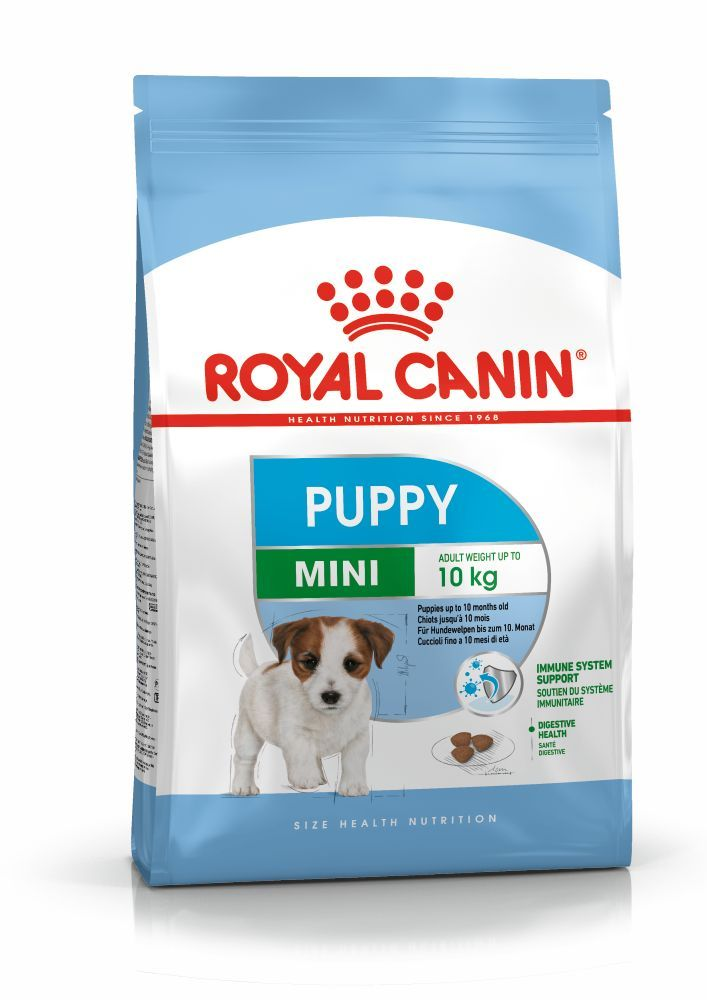
When choosing food for a Bichon Frisé, there are many factors to consider: Their age, lifestyle, activity level, physiological condition, and health including potential sickness or sensitivities. Food provides energy to cover a dog’s vital functions, and a complete nutritional formula should contain an adjusted balance of nutrients to avoid any deficiency or excess in their diet, both of which could have adverse effects on the dog.
The following recommendations are for healthy animals. If your dog has health problems, please consult your veterinarian who will prescribe an exclusive veterinary diet.
Clean and fresh water should be available at all times to support your dog’s urinary health. In hot weather and especially when out exercising, bring water along for your dog’s frequent water breaks.
A Bichon Frisé puppy’s requirements, in terms of energy, protein, minerals, and vitamins, are much greater than those of an adult dog. They need energy and nutrients to maintain their body, but also to grow and build it. Until they are 8 months old, a Bichon Frisé puppy's immune system develops gradually. A complex of antioxidants – including vitamin E – can help support their natural defences during this time of big changes, discoveries, and new encounters. Their digestive functions are different from those of an adult Bichon Frisé, too: Their digestive system is not mature yet so it’s important to provide highly-digestible proteins that will be effectively used. A balanced intake of fibres, such as psyllium, can help facilitate intestinal transit and contribute to good stool.
Similarly, a puppy’s teeth – starting with the milk teeth, or first teeth, then the permanent teeth – are an important factor that needs to be taken into account when choosing the size, form, and hardness of kibble. This growth phase also means high energy needs, so the food must have a high energy content (expressed in Kcal/100g of food), while concentrations of all other nutrients will also be higher than normal in a specially-formulated growth food. It is recommended to split the daily allowance into three meals a day until they are six months old, then to switch to two meals per day.
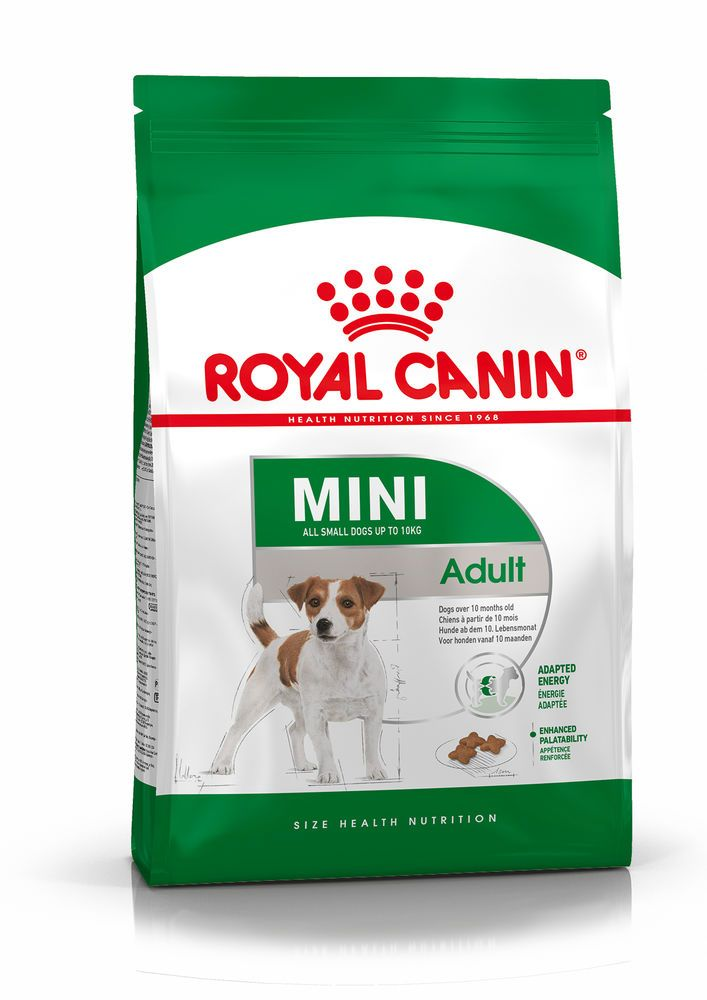
The main nutritional goals for adult Bichon Frisés are:
Maintaining an ideal body weight by using highly-digestible ingredients and keeping the fat content at a sensible level. The Bichon Frisé is essentially an indoor dog and might have a tendency to put on weight. To help maintain an ideal weight and keep their joints healthy, they must have an adapted diet that boosts their muscle tone. They should also be exercised every day. It is important to avoid feeding them human foods or fatty snacks and to strictly follow the feeding guidelines written on the package in order to prevent excessive weight gain. Apart from their indoor lifestyle, neutering is also a factor in the dog becoming overweight.
Helping support a healthy urinary system. Bichons Frisés are predisposed to urinary stones that form in the bladder or urinary tract. The cause is a low volume of urine and an insufficient number of mictions. An optimal mineral content within a balanced diet can help limit this disorder.
Preserving the health and beauty of their skin and coat. Bichon Frisés are known for their sensitive skin, so they need a specific diet that will provide them with nutrients like omega-3 fatty (EPA and DHA) and vitamin A. Their coat grows constantly so requires regular grooming.
Preventing dental issues. By reducing tartar formation on the teeth, which is responsible for dental plaque, the kibble plays an essential role in helping combat oral disorders. A formula that contains calcium chelators will support dental health by reducing the tartar formation. The size of the kibble should be very small and adapted to the miniature jaw of Bichon Frisés in order to avoid problems with picking up food. This may also stimulate their fussy appetite.
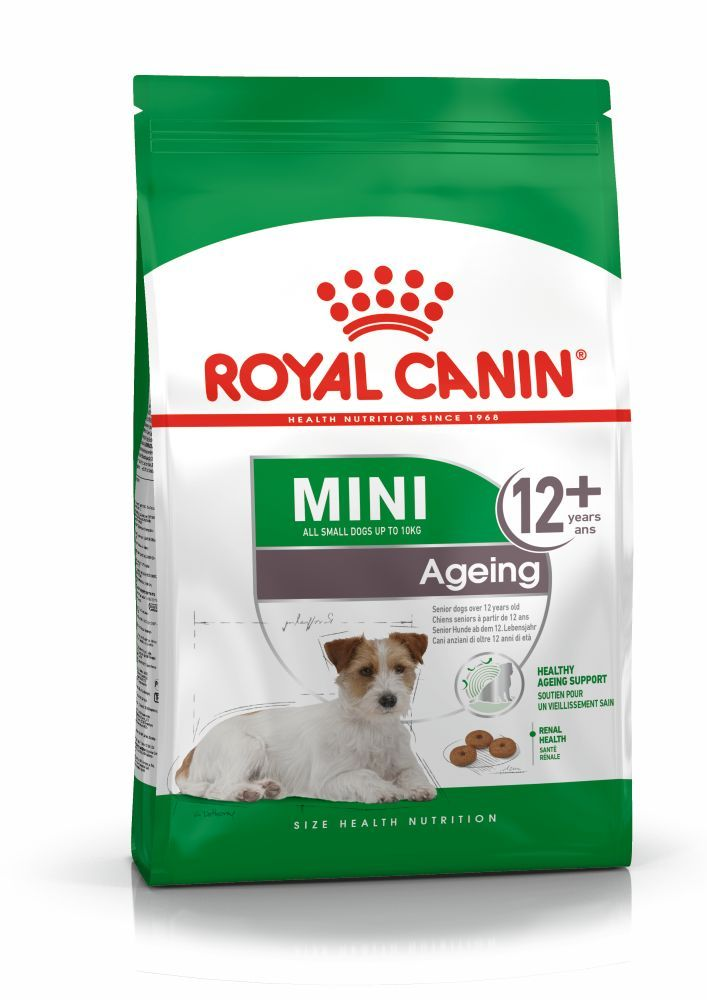
After 8 years old, Bichon Frisés start to face the first signs of ageing. A diet enriched with antioxidants helps maintain vitality, and key nutrients, such as taurine, help support good cardiac function. Ageing is also accompanied by the modification of digestive capacities and particular nutritional requirements, so food for ageing Bichon Frisés should have the following characteristics:
Higher vitamin C and E content. These nutrients have antioxidant properties, protecting the body’s cells against the harmful effects of the oxidative stress linked to ageing.
High-quality protein. Contrary to a widely held misconception, lowering the protein content in food brings little benefit in limiting kidney failure because older dogs are less efficient at using dietary protein than younger dogs. Reducing the phosphorus content is the only way of slowing down the gradual deterioration of kidney function.
A higher proportion of the trace elements iron, zinc, and manganese to maintain good condition of the skin and coat.
A higher quantity of polyunsaturated fatty acids (borage oil, fish oil) to maintain the quality of the coat. Dogs normally produce these fatty acids, but ageing can affect this physiological process.
As they age, dogs increasingly suffer from teeth problems. To ensure they continue to eat in sufficient quantities, the shape, size, and hardness of their kibble needs to be tailoured to their jaw.
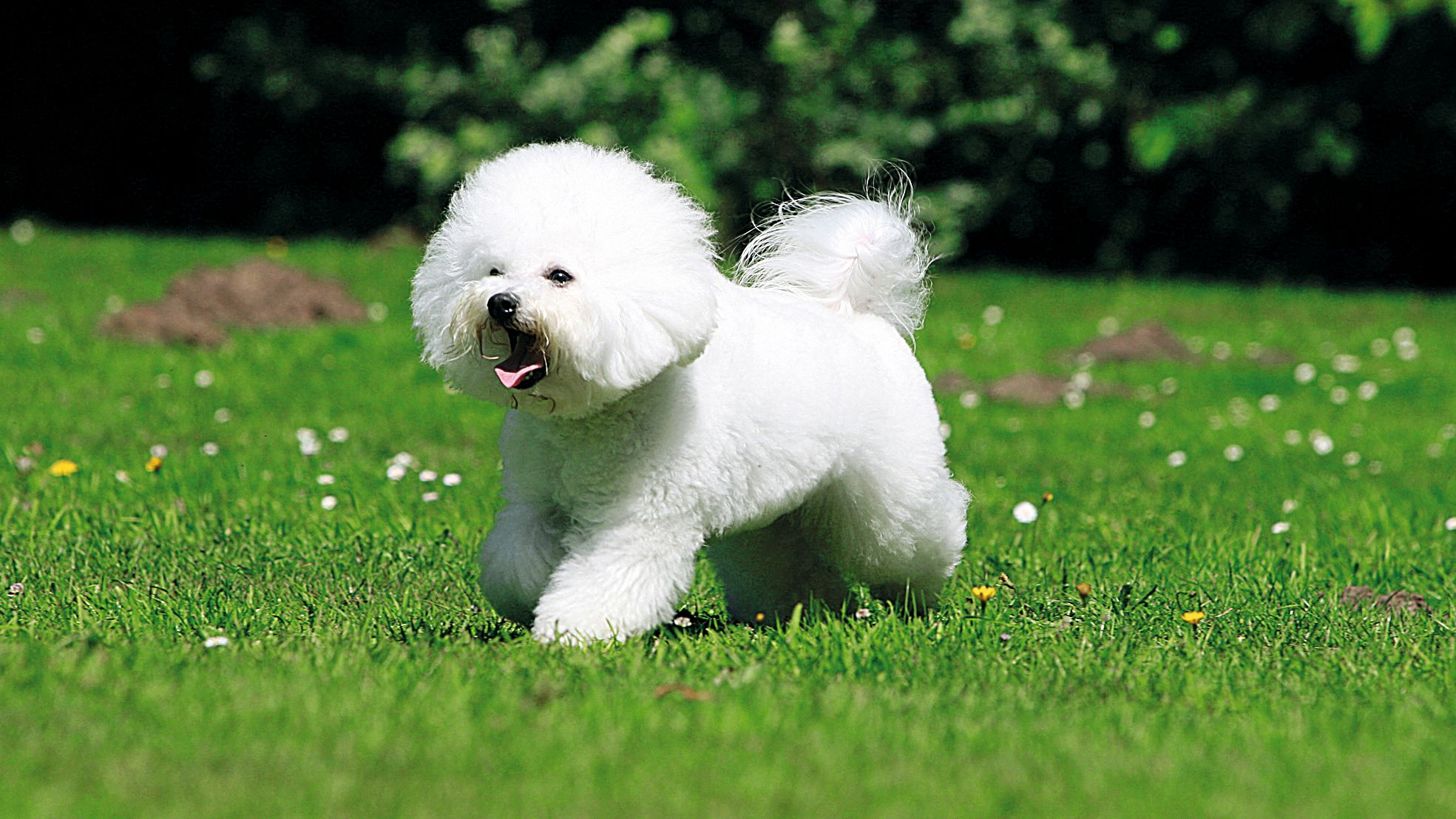
Caring for your Bichon Frisé
Grooming, training and exercise tips
7/7
All about Bichon Frisés
While we can’t speak for the entire breed, Bichon Frisés are known to be affectionate and devoted to their human owners. While they love to play – ideally with you – your lap works as well as any pillow when nap time comes around.
Most people ask this thinking that, because the breed doesn’t shed, Bichon Frisés are hypoallergenic. The truth is that no dog is 100% allergen-free. Having said that, the Bichon Frisé breed regularly makes lists as one of the best choices for allergy sufferers as they don't really shed.
Suggested Breeds
Read more on this topic
Sources
- Veterinary Centers of America https://vcahospitals.com/;
- Royal Canin Dog Encyclopaedia. Ed 2010 and 2020
- Banfield Pet Hospital https://www.banfield.com/
- Royal Canin BHN Product Book
- American Kennel Club https://www.akc.org/
Like & share this page